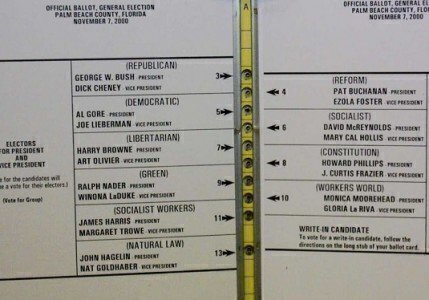On December 12, 2000, the Supreme Court ended a Florida vote recount in the presidential election contest between George W. Bush and Al Gore. The Court’s decision remains debated today.

On November 8, 2000, a preliminary vote tally in Florida showed Bush leading Gore by about 1,700 votes in the state. With its 25 electoral votes up for grabs, the winner in Florida would become the next President of the United States.
The initial vote tally was so close in Florida, with a less than 0.5 percent difference, that Florida’s state laws triggered an automatic machine recount. The first recount left Bush with just a 317-vote margin over Gore. Gore asked for a manual recount in four counties as allowed under Florida’s law. Over the next weeks, Democrats and state officials fought over deadlines related to the recount and the need for deadline extensions.
On November 26, 2000, Florida Secretary of State Katherine Harris certified that Bush had won the election by a 537-vote margin. Gore then sued Harris because all of the recounts had not been completed when she certified the results. On December 8, 2000, the Florida Supreme Court sided with Gore, ordering that all statewide “undervote” ballots, or punch-card ballots that had been cast but not registered because of a problem called a “hanging chad,” needed to be recounted.
Bush immediately appealed to the United States Supreme Court, which ordered the recount halted on December 9, 2000 until it could hear arguments in the case. The Justices faced a legal deadline: Under federal law (3 U.S. Code § 5) known as the safe harbor provision, a state must determine its electors six days before the Electoral College members meet in person. In 2000, that deadline was December 12 and the arguments would be held on December 11, giving the Court one day to reach a decision.
On December 12, 2000, the divided Court issued an unsigned per curium main decision, with concurrences and dissents written by specific justices.
Link: Read The Decision
In the first part of the decision, seven justices (including liberals Stephen Breyer and David Souter) agreed with Bush that his Equal Protection rights were violated because there was no existing legal standard to recount the punch-card ballots.
Another part of the decision, a 5-4 vote along ideological lines, said that any solution to the recount problem couldn’t be put in place by December 12, the safe-harbor deadline. The Florida Supreme Court of Florida, the majority said, indicated that the Florida state legislature wanted Florida’s electors to “participat[e] fully in the federal electoral process” by honoring the December 12 safe-harbor deadline.
The Supreme Court decision, in total, went against the Florida Supreme Court, remanding the case back to it for further action. But since the safe-harbor deadline was passed, Bush remained as the certified winner in Florida, and Gore conceded the next day.
Since 2000, there have been attempts to figure out what would have happened if various types of recounts were permitted. The website Factcheck.org looked back on these efforts in 2008, concluding that “nobody can say for sure who might have won. A full, official recount of all votes statewide could have gone either way, but one was never conducted.” (In 2001, three other media groups did their own recount studies, with various results.)
In 2012, Justice Antonin Scalia told CNN that in his time on the bench, the Bush v. Gore decision was the one decision most people had asked him about. “My court didn’t bring the case into the courts, it was brought into the courts by Al Gore. He is the one who wanted courts to decide the question,” Scalia said. “The only question in Bush versus Gore was whether the presidency would be decided by the Florida Supreme Court or the United States Supreme Court. That was the only question and that’s not a hard one.”
But retired Justice Sandra Day O’Connor, who voted with the majority, later said in 2013 she had regrets about the decision. In 2013, she told the Chicago Tribune the Court “took the case and decided it at a time when it was still a big election issue. … Maybe the court should have said, ‘We’re not going to take it, goodbye.’”







